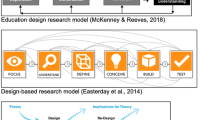Abstract
The object of inquiry in instructional technology is not simply knowledge, but useable knowledge. This paper explores the dimensions of relevance with respect to research and suggests ways the research community can accommodate the needs and interests of practicing professionals in the field. Research relevance is examined as a reflection of: (a) practitioner and disciplinary values; (b) perceived credibility, viewed in terms of authenticity, methods employed, and replicability; and (c) perceptions of utility based upon the concrete nature of the findings. Specific recommendations relate to expanding the range of topics addressed in our research, expanding the range of research methods employed, orienting our research communication to specific practitioner communities, conducting research under natural conditions, replicating research, and establishing links between abstract and concrete findings. Finally, the role of the practitioner as an educated consumer of research is discussed.
Similar content being viewed by others
References
Adamski, A. (1998).The development of a systems design model for job performance aids: A qualitative developmental study. Unpublished doctoral dissertation. Detroit, MI: Wayne State University.
Atchison, B.J. (1996).Roles and competencies of instructional design as identified by expert instructional designers. Unpublished doctoral dissertation, Detroit, MI: Wayne State University.
Chinn, C.A., & Brewer, W.F. (1993). The role of anomalous data in knowledge acquisition: A theoretical framework and implications for science instruction.Review of Educational Research, 63(1), 1–49.
Clark, R.E. (1989). Current progress and future directions for research in instructional technology.Educational Technology Research & Development, 37(1), 57–66.
Clark, R.E., & Snow, R.E. (1975). Alternative designs for instructional technology research,AV Communication Review, 23(X), 373–394.
Clifford, G.J. (1973). A history of the impact of research on teaching. In R.M.W. Travers (Ed.)Second handbook of research on teaching (pp. 1–46). Chicago: Rand McNally.
Dale, E. (1946)Audio-visual methods in teaching. New York: The Dryden Press.
Driscoll, M.P. (1995). Paradigms for research in instructional systems. In G.J. Anglin (Ed.),Instructional technology: Past, present, and future (2nd Ed.) (pp. 322–329). Englewood, CO: Libraries Unlimited, Inc.
Finn, J.D. (1953). Professionalizing the audio-visual field.Audio-Visual Communication Review 1(1), 6–18. (Reprinted in D.P. Ely & T. Plomp (1996).Classic writings on instructional technology (pp. 231–241). Englewood, CO: Libraries Unlimited, Inc.)
Gagné, R.M., Briggs, L.J., & Wager, W.W. (1992).Principles of instructional design (4th ed.). Fort Worth, TX: Harcourt Brace Jovanovich.
Gagné, R.M., Mayor, J.R., Garstens, H.L., & Paradise, N.E. (1962). Factors in acquiring knowledge of a mathematical task.Psychological Monographs, 76 (7, Whole No.526).
Goldenberg, S. (1992).Thinking methodologically. New York: Harper Collins Publishers.
Hannafin, M.J., Hannafin, K.M., Land, S.M., & Oliver, K. (1997). Grounded practice and the design of constructivist learning environments.Educational Technology Research and Development, 45(3), 101–117.
Heinich, R. (1984). The proper study of instructional technology.Educational Communications and Technology Journal, 32(2), 67–87.
Herrnson, P.S. (1995). Replication, verification, secondary analysis, and data collection in political science.Political Science & Politics, 27(3), 452–455.
Higgins, N., & Sullivan, H. (1989). Perspectives on educational technology research and development.Educational Technology Research & Development, 37(1), 7–17.
Hill, J.R., & Hannafin, M.J. (1997). Cognitive strategies and learning from the world wide web.Educational Technology Research & Development, 45(4), 37–64.
House, E.R. (1991). Realism in research.Educational Researcher, 20(6), 2–9, 25.
House, E.R., Mathison, S., & McTaggart, R. (1989). Validity and teacher inference.Educational Researcher, 18(7), 11–15, 26.
Jones, T.S. (1998).Validating the process of designing and developing instructional materials using the rapid prototyping methodology. Unpublished doctoral dissertation. Detroit, MI: Wayne State University.
Kaplan, A. (1964).The conduct of inquiry: Methodology for behavioral science. San Francisco: Chandler Publishing Company.
Keller, J.M. (1983). Motivational design of instruction. In C.M. Reigeluth (Ed.)Instructional-design theories and models: An overview of their current status (pp. 383–434). Hillsdale, NJ: Lawrence Erlbaum Associates, Publishers.
Keller, J.M. (1987). The systematic process of motivational design.Performance and Instruction, 26(10), 1–8.
King, G. (1995). Replication, replication.Political Science & Politics, 27(3), 444–452.
Kuhn, G. (1997).Using problem-based learning techniques to develop the expertise of emergency medicine residents. Unpublished doctoral dissertation, Detroit, MI: Wayne State University.
Lincoln, Y.S., & Guba, E.G. (1985).Naturalistic inquiry. Beverly Hills, CA: Sage Publications.
Lindblom, C.E., & Cohen, D.K. (1979).Usable knowledge: Social science and social problem solving. New Haven, CT and London, England: Yale University Press.
Lumsdaine, A.A. (1963). Instruments and media of instruction. In N. Gage (Ed.),Handbook of research on teaching (pp. 583–682). Chicago: Rand McNally.
McCracken, G. (1988).The long interview. Newbury Park, CA: Sage Publications.
Mishler, E.G. (1979). Meaning in context: Is there any other kind?Harvard Educational Review, 49(1), 1–19.
Reigeluth, C.M. (1997). Instructional theory, practitioner needs, and new directions: Some reflections.Educational Technology, 37(1), 42–47.
Richey, R.C. (1992).Designing instruction for the adult learner: Systemic training theory and practice. London/Bristol, PA: Kogan Page/Taylor and Francis.
Richey, R.C. (1997) Research on instructional development.Educational Technology Research and Development, 45(3), 91–100.
Richey, R.C., & Nelson, W. (1996). Developmental research. In D. Jonassen (Ed.),Handbook of Research for Educational Communications and Technology (pp. 1213–1245). New York: Simon & Schuster.
Ross, S.M., & Morrison, G.R. (1989). In search of a happy medium in instructional technology research: Issues concerning external validity, media replications, and learner control.Educational Technology Research and Development, 37(1), 19–33.
Ross, S.M., & Morrison, G.R. (1996). Experimental research methods. In D. Jonassen (Ed.),Handbook of research for educational communications and technology (pp. 1148–1170). New York: Macmillan Simon & Schuster.
Schwen, T.M. (1977). Professional scholarship in educational technology: Criteria for judging inquiry.AV Communication Review, 25(1), 5–24.
Seels, B. (1997). The relationship of media and ISD theory: The unrealized promise of Dale's cone of experience. In M.R. Simonson, O. Abel, N. Maushak, and K. Wright (Eds.).19th Annual Proceedings: Selected Research and Development Papers Presented at the 1997 Annual Convention of the Association for Educational Communications and Technology (pp. 357–361). Ames, Iowa: Iowa State University and Association for Educational Communications and Technology.
Strike, K.A. (1979). An epistemology of practical research.Educational Researcher, 9(1), 10–16.
Author information
Authors and Affiliations
Rights and permissions
About this article
Cite this article
Richey, R.C. The pursuit of useable knowledge in instructional technology. ETR&D 46, 7–22 (1998). https://doi.org/10.1007/BF02299670
Issue Date:
DOI: https://doi.org/10.1007/BF02299670




